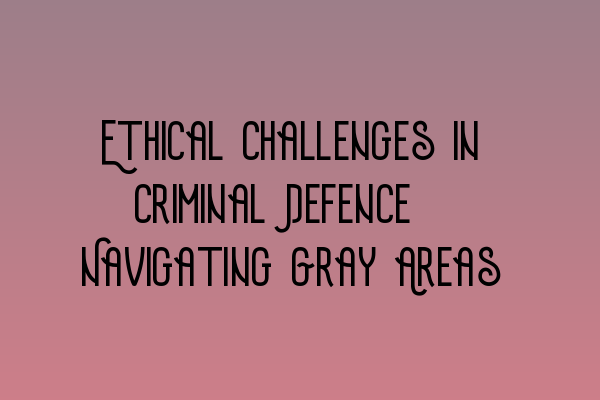Ethical Challenges in Criminal Defence: Navigating Gray Areas
As criminal defence solicitors, we are tasked with representing our clients to the best of our abilities, ensuring their rights are upheld and providing them with a fair trial. However, in the practice of criminal law, we often encounter ethical challenges that require careful consideration and navigation of gray areas.
One of the most significant ethical challenges faced by criminal defence solicitors is the responsibility to uphold the principles of justice while defending clients who may be guilty of a crime. It is our duty to ensure that every person, regardless of their alleged wrongdoing, is afforded their rights and receives a fair trial. This requires us to maintain a strict adherence to the rule of law and ethical standards, even when faced with difficult and morally ambiguous cases.
In navigating these gray areas, criminal defence solicitors must strike a delicate balance between vigorously advocating for their clients and upholding their own professional and ethical obligations. While we are bound to represent our clients’ best interests, we must also consider the impact of our actions on the justice system as a whole.
One ethical challenge that frequently arises in criminal defence cases is the issue of confidentiality. Solicitors have a duty to maintain client confidentiality, which is essential for ensuring trust between lawyers and their clients. However, this duty may conflict with the obligation to disclose information that could prevent harm to others or assist in the investigation of a crime. Striking the right balance between these duties is critical and requires careful consideration of the specific circumstances and legal obligations.
Another challenge faced by criminal defence solicitors is the temptation to manipulate or distort evidence in order to secure a favorable outcome for their clients. While it may be tempting to utilize questionable tactics, such actions would not only undermine the integrity of the legal system but also compromise the solicitor’s professional reputation. Maintaining honesty and integrity throughout the legal process is of utmost importance, despite the pressure to achieve a positive outcome.
Furthermore, the ethical challenges extend to the issue of conflicts of interest. Solicitors must ensure that they do not compromise their duty to act in the best interests of their clients due to personal or financial considerations. Identifying and managing potential conflicts of interest is crucial to maintaining professional integrity and providing unbiased representation.
In conclusion, as criminal defence solicitors, we must navigate various ethical challenges presented in the course of our work. Upholding the principles of justice, maintaining client confidentiality, preserving honesty and integrity, and managing conflicts of interest are just a few of the complex considerations we encounter. It is through careful navigation of these gray areas that we can fulfill our duty to provide competent and ethical representation to our clients.
For further reading on related topics, you may find the following articles helpful:
- Essentials of Consideration: Understanding the Backbone of Contracts
- Mistake in Contract Law: Unraveling the Impact on Agreement Validity
- Counter-offers: The Art of Negotiating in Contract Law
- SQE Workshops on Contract Law: Strengthening Your Knowledge and Skills
- Recent Judgements in Contract Law: Staying Up to Date with Legal Precedents
